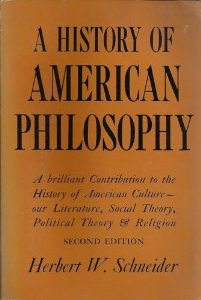 Herbert W. Schneider, who is no friend of Christianity, makes an interesting observation in his widely-used philosophy text, A History of American Philosophy (New York: Columbia University Press, 1946).
Herbert W. Schneider, who is no friend of Christianity, makes an interesting observation in his widely-used philosophy text, A History of American Philosophy (New York: Columbia University Press, 1946).
Schneider observes, “as the New England church covenants gradually became secularized and were increasingly indistinguishable from the town ordinances, the `standing order’ (as the New England theocracy was called) was put on the defensive and resisted the growth of both political and religious individualism” (12).
Schneider's comment raises the question of what actually happened in those specific cases where Christians succeeded in governing themselves and others in the civil kingdom by legislating particular laws of Moses, as in the historical scenario Schneider describes above. Could it be that when this happened another law raised its head--the law of unintended consequences?
Fleshing out Schneider's point a bit may help to illustrate the fact that legislating “biblical” morality in the civil kingdom often serves to aid the process of secularization--the very thing those seeking to implement biblical legislation are trying to avoid. There are four things we ought to consider in this regard.
First, when the Ten Commandments are applied to the civil kingdom, they must be removed from their redemptive-historical context and then re-written by legislators so as to conform to the community's standard--this is the first and inevitable step toward the secularization of those same laws. Apart from a "general equity," Israel's theocratic kingdom was never intended to be a model for secular civil government.
Take, for example, Sabbath legislation (the fourth commandment, and part of the so-called first table of the law). What happened when Christians succeeded in passing laws which mandated that no commerce be conducted in a given community on Sunday? For a Christian, the Lord's Day has profound theological significance as a day of "festive rest," and as a foretaste of the eternal Sabbath rest yet to come. We see the Lord's Day as a wonderful gift from God, not as a burden.
I dare say, non-Christians see the same legislation quite differently. Sabbath legislation (the chief of the so-called "blue laws") interferes with their businesses, their pursuit of pleasure, and their personal freedom. As such, many came to regard such legislation as coercive--people were forced to rest on Sunday, precisely because such legislation has no explanatory theological context for them. Lacking that context, Sabbath legislation makes non-Christians hostile to those who force their religious practices on others. It is not an accident that the blow-back from non-Christians was especially pronounced in those communities where Moses (and Israel's divine theocracy) figured prominently in a city's penal code (Schneider's point).
That said, it is true that the moral law is binding upon all people (Romans 2:14-15). Therefore, ought not we (as Christians) be satisfied when we are free from government legislation (or interference) which would seek to prevent us from closing our businesses on Sundays, from devoting ourselves to word and sacrament on the Lord's Day, and from enjoying Sunday as a day of rest? The fact is, we are free to do so, and in many cases the state or secular employers recognize our freedom to worship as we see fit.
Here's the theological rub raised by Schneider's observation. Must others enjoy this day too? Yes, they must. Given the moral law's function as the "teacher of sin," all will answer to their creator for their violations of the moral law. But how do non-Christians understand they are still breaking God's Sabbath commandment (their refusal to acknowledge the rest from our works that was secured for us by Jesus in his redemptive work as the Lord of the Sabbath), even when they do not open their businesses on Sunday, and when they mistakenly feel as though all is well because they obey the town's "standing order"? Civic righteousness--which many non-Christians possess--is not a justifying righteousness. The law loses its power when it becomes a mere community standard. It no longer exposes sin and drives us to Christ.
Second, when the specific application of such legislation inevitably moves to the civil courts for adjudication in those instances where laws are violated (say when someone opens his store on Sunday, and is then arrested and fined), the case is handled by a secular court, and by secular officials. Again, in a court there is no biblical context for taking Sunday as a day of rest. Image the scenario which often played out in the New England of Schneider's description. What happens to the law of Moses in the hands of a New England judge who happens to be a deist, or a Unitarian? What happens when an unregenerate, yet moral group of citizens, weighs in on whether or not such a law is just. Frankly, this did not work out the way Christians originally intended that it would. The aim of law in the civil kingdom is civic righteousness (i.e. good citizens), peace, and the rule of law. Ironically, passing "Mosaic" legislation may not enhance civic righteousness, and actually work against it, since this puts a non-Christian in the role as arbiter of God's original saving purposes, which they do not, and indeed cannot understand.
The reality is that we live in a nation at a time and place when our laws (by and large) are already codified and in force. To talk about the ideal can be a waste of time--especially when the ideal will never conform to the reality. Yet, discussing the ideal may help us understand what is at stake in the future. In this light, we can say that it would be a good thing for the citizens of a given community to draft future legislation (with Christians whole-heartedly participating in the process as citizens), and which gives Christians the freedom to interpret and apply the first table of the law in the proper religious context (the church, and its God-given keys). But then, the same would hold true for Jews, Muslims, and others. At the same time, and as far as possible, the second table of the law must be duly considered to protect life, liberty, and private property.
Third, those who reject the authority of Scripture, the exclusivity of Christianity, the biblical teaching regarding human sin, the doctrine of the Trinity, the deity of Christ, and the necessity of redemption by a Savior dying upon a cross who then rose from the dead, will resist such religious laws whenever the proper redemptive historical context is mentioned. Christians see the law of Moses as the rule of sin and the teacher of gratitude. The law serves a vital function and is necessarily connected to the Gospel. But non-Christians see these laws as an outdated relic of the past, as a burden, a nuisance, and as binding their consciences to something they do not believe. To invoke the name of Jesus in the civil kingdom is to ask for trouble--perhaps this is the case because too often Christians present Jesus to those interested in civic righteousness as a new Moses (essentially a law-giver, i.e., the social justice Jesus of the Christian left, or the spoil-sport Jesus of the Christian right). Perhaps Jesus would not be so easily misunderstood if Christians presented him as "the Lamb of God who takes away the sin of the world." Non-Christians will always be offended by Jesus--I know that. But let them be offended by the Jesus of the Bible, and not the Jesus of much of American Christianity.
Finally, when the law of unintended consequences rears it head, Christians often find themselves tempted to compromise their own moral commitments--so as to make "Christian" legislation palatable to non-Christian citizens, or to avoid the kind of situations described above. No doubt, Christians are also tempted to retreat back into the church and avoid (or depreciate) their civic responsibilities, or create their own religious communities, so as to preserve conscience, and to nurse their wounded pride, which has been made sore from the blows inflicted upon them by the non-Christians who vehemently object to Christian involvement in the public square.
Schneider and many others (see, for example, my short review of the biography of Henry Beecher by Debby Applegate -- Beecher Biography) make a case that the Calvinism of New England Congregationalism was quickly in full retreat in the face of German Idealism (i.e., Schleiermacher) and with the rise of Transcendentalism. Both of these philosophies emphasized personal freedom in all matters of religion, and each stressed (in different, but related ways) an epistemological justification arising directly from religious experience.
Calvinism's stress on a sovereign God, as well as guilt before God and the bondage of humanity to sin (both Adamic and personal) was seen as the problem in a New England which grew increasing hostile to all forms of Christian moralism--especially when it came from Calvinists.
Whenever Calvinism (in its American varieties) becomes preoccupied with legislating "the standing order" and sees its reason to exist as transforming or "Christianizing" the community, we pick a fight we will inevitably lose. This is not because Calvinism is flawed, nor because the law of God has no power. This is because Christianity always has a greater impact when Christians are preoccupied with fulfilling the great commission, and not confusing that commission with the cultural mandate.
And so I ask, is it not better, on the one hand, for Christians to seek to be good citizens in the civil kingdom (i.e., we vote according to conscience, we seek to make our communities better and safer for all, etc.), and on the other, to keep Moses right where he belongs--as that Old Testament mediator who points us to Christ. Moses does not fare very well in the hands of a city council, or a Congress.
More importantly, this leaves plenty of room in the civil kingdom to appeal to the moral law (held in common by most) to govern ourselves, without compromising the redemptive-historical context in which God revealed his law to Moses and to his covenant people, Israel. We are far better off doing that, than in seeking to create a "standing order" in the civil kingdom.
 Monday, June 10, 2013 at 10:01AM
Monday, June 10, 2013 at 10:01AM 







